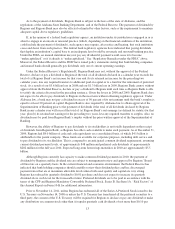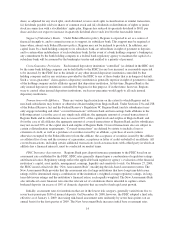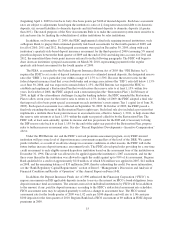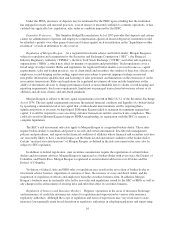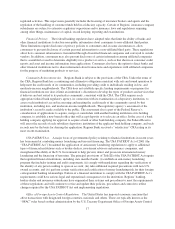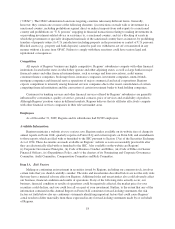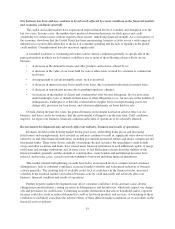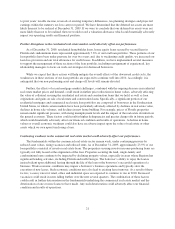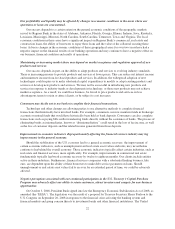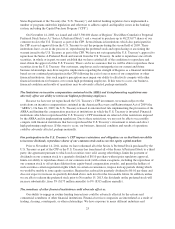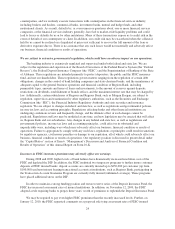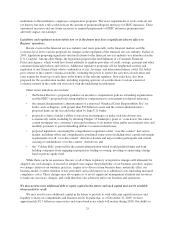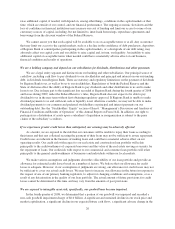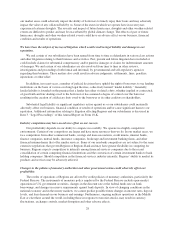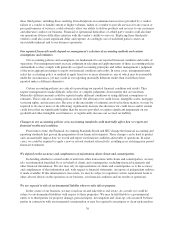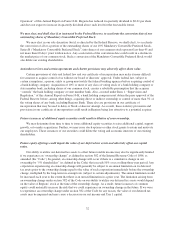Regions Bank 2009 Annual Report Download - page 37
Download and view the complete annual report
Please find page 37 of the 2009 Regions Bank annual report below. You can navigate through the pages in the report by either clicking on the pages listed below, or by using the keyword search tool below to find specific information within the annual report.States Department of the Treasury (the “U.S. Treasury”) and federal banking regulators have implemented a
number of programs under this legislation and otherwise to address capital and liquidity issues in the banking
system, including the Capital Purchase Program (“CPP”).
On November 14, 2008, we issued and sold 3,500,000 shares of Regions’ Fixed Rate Cumulative Perpetual
Preferred Stock Series A (“Series A Preferred Stock”) and a warrant to purchase up to 48,253,677 shares of our
common stock to the U.S. Treasury as part of the CPP. Several financial institutions which also participated in
the CPP received approval from the U.S. Treasury to exit the program during the second half of 2009. These
institutions have, or are in the process of, repurchasing the preferred stock and repurchasing or auctioning the
warrant issued to the U.S. Treasury as part of the CPP. We have not yet requested the U.S. Treasury’s approval to
repurchase the Series A Preferred Stock and warrant from the U.S. Treasury. In order to repurchase one or both
securities, in whole or in part, we must establish that we have satisfied all of the conditions to repurchase and
must obtain the approval of the U.S. Treasury. There can be no assurance that we will be able to repurchase these
securities from the U.S. Treasury. Our customers, employees and counterparties in our current and future
business relationships may draw negative implications regarding the strength of Regions as a financial institution
based on our continued participation in the CPP following the exit of one or more of our competitors or other
financial institutions. Any such negative perceptions may impair our ability to effectively compete with other
financial institutions for business or to retain high performing employees. If this were to occur, our business,
financial condition and results of operations may be adversely affected, perhaps materially.
The limitations on incentive compensation contained in the ARRA and its implementing regulations may
adversely affect our ability to retain our highest performing employees.
Because we have not yet repurchased the U.S. Treasury’s CPP investment, we remain subject to the
restrictions on incentive compensation contained in the American Recovery and Reinvestment Act of 2009 (the
“ARRA”). On June 10, 2009, the U.S. Treasury released its interim final rule implementing the provisions of the
ARRA and limiting the compensation practices at institutions in which the U.S. Treasury is invested. Financial
institutions which have repurchased the U.S. Treasury’s CPP investment are relieved of the restrictions imposed
by the ARRA and its implementing regulations. Due to these restrictions, we may not be able to successfully
compete with financial institutions that have repurchased the U.S. Treasury’s investment to retain and attract
high performing employees. If this were to occur, our business, financial condition and results of operations
could be adversely affected, perhaps materially.
Our participation in the U.S. Treasury’s CPP imposes restrictions and obligations on us that limit our ability
to increase dividends, repurchase shares of our common stock and access the equity capital markets.
Prior to November 14, 2011, unless we have redeemed all of the Series A Preferred Stock purchased by the
U.S. Treasury as part of the CPP or the U.S. Treasury has transferred all of the Series A Preferred Stock to a third
party, the agreement pursuant to which such securities were sold, among other things, limits the payment of
dividends on our common stock to a quarterly dividend of $0.10 per share without prior regulatory approval,
limits our ability to repurchase shares of our common stock (with certain exceptions, including the repurchase of
our common stock to offset share dilution from equity-based compensation awards), and grants the holders of
such securities certain registration rights which, in certain circumstances, impose lock-up periods during which
we would be unable to issue equity securities. Regions has reduced its quarterly dividend to $0.01 per share and
does not expect to increase its quarterly dividend above such level for the foreseeable future. In addition, unless
we are able to redeem the preferred stock prior to November 15, 2013, the dividends on the preferred stock will
increase substantially, from 5% ($175 million annually) to 9% ($315 million annually).
The soundness of other financial institutions could adversely affect us.
Our ability to engage in routine funding transactions could be adversely affected by the actions and
commercial soundness of other financial institutions. Financial services companies are interrelated as a result of
trading, clearing, counterparty, or other relationships. We have exposure to many different industries and
23


